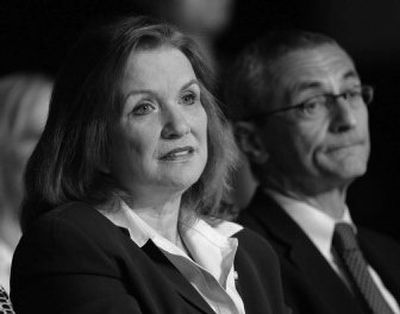Democrats outline health care proposals

LAS VEGAS – Former Sen. John Edwards, joined by his wife, Elizabeth, returned Saturday to the give-and-take of presidential campaigning with a pledge to stay in the Democratic race “for the duration” and a challenge to rivals to spell out their plans for universal health care coverage.
“One of the reasons I want to be president is to make sure every woman and every person in America gets the same kind of things that we have,” the former North Carolina senator said of the wealthy couple’s access to top-notch medical treatment. “No American should have to worry about that.”
The appearance was Edwards’ first in public since announcing plans to press on with his candidacy after learning that his wife’s breast cancer has returned in an incurable, but treatable, form. The fact that his appearance came at a labor forum dedicated to health care was coincidental. But the emotional backdrop lent their appearance – Edwards on stage, his wife in the audience – greater poignancy and added weight to an issue he has emphasized in his campaign.
First, however, he had to address questions about his political viability and capacity to operate under increased stress. Looking worn, with puffy bags under his eyes, Edwards told moderator Karen Tumulty of Time magazine, “I’m definitely in the race for the duration.”
“We know what it’s like to function in a very difficult environment,” Edwards said, mentioning the death of the couple’s 16-year-old son more than a decade ago and Elizabeth Edwards’ first round of treatment for breast cancer after the 2004 campaign. “I know, because we’ve done it in the past, that we can do it.”
The forum on the University of Nevada campus, near the Las Vegas Strip, featured six of the Democratic White House contestants, each appearing separately. None of the Republican hopefuls appeared, possibly because the sponsors – the Center for American Progress Action Fund and the Service Employees International Union – are so closely associated with Democratic campaigns and causes.
The session was tamer than one held about a month earlier in Carson City. This time, the war in Iraq was mentioned only in passing, as a drain on money the candidates would rather spend on domestic needs, such as expanded health care.
The biggest disagreement among the major contenders was over the need to raise taxes to pay for universal coverage, a shared goal.
Edwards, who has offered the most detailed health care proposal, said his plan would cost as much as $120 billion annually and be financed by raising taxes on families making more than $200,000 a year.
“We don’t get universal health care for free,” Edwards said, suggesting the candidates need to be honest with voters. “Honesty starts right here in the campaign.”
No other candidate signed on to Edwards’ tax boost, although Sens. Hillary Rodham Clinton of New York and Barack Obama of Illinois said there might be a need for added revenues “on the front end,” as Obama put it, that could be recouped through savings later.
Participating in his first such candidate forum, Obama seemed more tentative than usual. He promised his own detailed health care plan in the next few months, but suggested the more important question was whether there was “the political will and sense of urgency to actually get it done.”
Clinton, who led the unsuccessful fight to expand health care coverage during her husband’s administration, said she would start this time by ending “insurance discrimination” that allows companies to refuse coverage to applicants with pre-existing conditions. Like others, she called for greater investment in prevention programs and improved technology, using the savings to make health care more widely available.
New Mexico Gov. Bill Richardson was the most adamant in ruling out tax increases and offered the most optimistic timetable, saying universal coverage could be implemented within a year by modifying the existing system and making better use of the trillions annually spent on health care.
Sen. Chris Dodd of Connecticut trumpeted his accomplishments in Washington, D.C., including his authorship of the 1993 Family Medical Leave Act. After 30-plus years on Capitol Hill, Dodd said, he had the personal relationships to get started on a health care overhaul the day he became president.
The candidates facing the longest odds offered the most dramatic proposals. Rep. Dennis Kucinich of Ohio called for a government-run, not-for-profit health care system, and former Sen. Mike Gravel of Alaska proposed a system run by a national Health Care Board that would distribute health care vouchers so Americans could shop for coverage.
“I know the system up close and personal,” Gravel said, noting that high medical bills had driven him into personal bankruptcy.